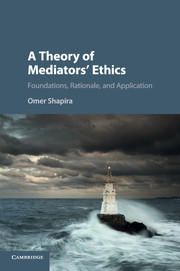Book contents
- Frontmatter
- Dedication
- Contents
- List of figures
- List of tables
- Preface
- Abbreviations of codes of conduct
- PART I A theory of professional ethics
- PART II A theory of mediators’ ethics
- 3 Mediation, mediators’ role, and mediators’ ethics
- 4 Party self-determination
- 5 Mediator competence
- 6 Conflicts of interest
- 7 Mediator impartiality
- 8 Professional integrity
- 9 Diligence, respect and dignity, and honesty
- 10 Confidentiality
- 11 Fairness
- 12 Maintaining the profession's standing and advancement of the profession
- 13 Advertising, solicitation, and mediator fees
- 14 Obligations to employers and principals
- PART III Dealing with ethical problems
- Appendix I A proposed model code of conduct for mediators
- Appendix II Model standards of conduct for mediators (2005)
- Bibliography
- Index
5 - Mediator competence
from PART II - A theory of mediators’ ethics
Published online by Cambridge University Press: 05 March 2016
- Frontmatter
- Dedication
- Contents
- List of figures
- List of tables
- Preface
- Abbreviations of codes of conduct
- PART I A theory of professional ethics
- PART II A theory of mediators’ ethics
- 3 Mediation, mediators’ role, and mediators’ ethics
- 4 Party self-determination
- 5 Mediator competence
- 6 Conflicts of interest
- 7 Mediator impartiality
- 8 Professional integrity
- 9 Diligence, respect and dignity, and honesty
- 10 Confidentiality
- 11 Fairness
- 12 Maintaining the profession's standing and advancement of the profession
- 13 Advertising, solicitation, and mediator fees
- 14 Obligations to employers and principals
- PART III Dealing with ethical problems
- Appendix I A proposed model code of conduct for mediators
- Appendix II Model standards of conduct for mediators (2005)
- Bibliography
- Index
Summary
Introduction
Mediator competence is hotly debated in the mediation discourse. What qualifications and skills are required of mediators? What kind of training should mediators undergo? Should mediators be licensed like lawyers, doctors, and other professionals? In the United States, Canada, Australia, and many other states there are no legal requirements for the practice of mediation in private settings. Any person can practice mediation if he or she is acceptable to the parties. However, there is a requirement for qualifications in many mediation programs established by states, courts, and professional mediator organizations. Persons who wish to conduct mediations in connection with these programs and be on their list of mediators must meet minimum requirements that vary from program to program. Some programs set requirements according to the type of mediated cases, requiring general qualifications for civil cases and special qualifications for categories of cases such as family or divorce, child custody, or domestic violence. Court programs sometimes set requirements that vary in accordance with the court with which mediators are listed, be it a civil court, family court, superior court, or other. The qualifications required of mediators may include requirements for good character; X hours of approved mediation training (for example, 20 hours in Alabama, 30 hours in Minnesota, 38 hours according to the Australia National Mediator Accreditation System, 40 hours in Indiana, or 180 hours according to the ADR Canada Chartered Mediators Accreditation Program); being a licensed attorney with X years of practice of law (for example, 4 years in Alabama, or 5 years in North Carolina) or having a degree in certain fields (for example, psychology, accountancy, social work) with X years of practice; completing X hours of continuing education every X years; or an undertaking to provide X hours of pro bono mediation services to the public every X years.
Developing requirements for mediator qualification, training courses, and continuing education programs is an important step in the process of professionalization. This chapter applies the lens of professional ethics to this issue. It begins with an explanation of the normative basis for a duty of mediator competence, and then explores the meaning of competence in view of the core definition of mediation and mediators’ role.
- Type
- Chapter
- Information
- A Theory of Mediators' EthicsFoundations, Rationale, and Application, pp. 163 - 182Publisher: Cambridge University PressPrint publication year: 2016



